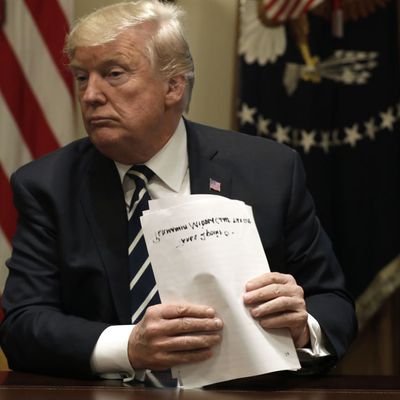
Among the many details in the Mueller report that give credence to the claim that the Trump management style is akin to the operating policies of the mob is a January 2018 interaction with former White House counsel Don McGahn. Trump wanted McGahn to refute a report from the New York Times claiming he wanted to fire Robert Mueller the previous June. McGahn refused, which caused Trump to unfurl his frustrations about McGahn’s note-taking.
“Why do you take notes?” Trump asked, according to the Mueller report. “Lawyers don’t take notes. I never had a lawyer who took notes.”
McGahn replied that a “real lawyer” takes notes because they create a record.
“I’ve had a lot of great lawyers, like Roy Cohn,” Mr. Trump said. “He did not take notes.”
The incident showed the president’s contempt for any sort of record that could hinder him from obscuring or contradicting the truth. Occasionally that means video, like when Trump denied calling Tim Cook “Tim Apple” to his face although it occurred on TV. But most often it’s note-taking. According to a report from the New York Times, Trump consistently derides his aides for jotting down their thoughts on whatever norm-violation is at hand. Even more unconventional is the rationale for his staff’s note-taking:
Time and again, Mr. Trump’s advisers took notes of their interactions with the president or drafted memos immediately afterward to maintain real-time records, in some cases simply to have an accurate understanding to do their jobs better, but in other cases for self-preservation. While aides in past administrations recognized that notes could become public and shied away from recording sensitive information in writing to protect the president, many of Mr. Trump’s aides took pen to paper to protect themselves from the president.
The paper includes a new account of former national-security adviser H.R. McMaster, in which the president “snapped” at Trump from taking notes. “Why are you always writing in that book?” Trump asked, according to people in the room.
There is precedent in the White House for aides not to take notes so that they don’t end up on the public record. White House documents — including emails, meeting notes, and phone messages — must be preserved for archival purposes, and presidential diaries can be viewed by investigators, as Ronald Reagan learned during the Iran-Contra scandal. But the Trump White House may be the first administration in which aides take notes to protect themselves.
“I do think there’s also a pervasive sense in this White House that at some point you’re going to have to set the record straight or give your perspective on events that took place, or actions you took — or didn’t take — as the case may be,” Cliff Sims, a former communications aide told the Times. Former aide Omarosa Manigault Newman added, “The first time I worked in the White House, for the Clinton administration, we were reluctant to send as many emails or to document so many things. But in the Trump White House, it is a requirement that you document these things always to protect yourself.”
Unlike his staff, Trump hasn’t been in the habit of preserving his own notes and memos in the White House. According to a Politico report from April 2018, there were at least two government officials being paid over $60,000 to tape back together all the material that Trump rips up. “We got Scotch tape, the clear kind,” an official told Politico, in order to reassemble “anything that happened to be on his desk that he was done with.”






























